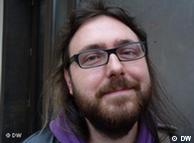Article from Deutche Welle, 11.1.2012
Author: Bernd Riegert
Link: http://www.dw-world.de/dw/article/0,,15649669,00.html
Maribor, Slovenia is one of two European Culture Capitals in 2012. One of the projects on offer – with a strong focus on European migration policies – is “Urban Furrows,” which offers migrants in-depth computer know-how.

Urban Furrows project manager Tomaz Gregorc
Portly, bearded Gregorc and his Rhizome Collective team work with immigrants from Africa and the former Yugoslavia who live in Maribor. With the help of donated computers, about 20 of them will have the opportunity to learn how to program and use open source software like Linux. They’ll create their own pages and platforms, the trained cultural scientist said.
Closing the digital divide
“We try to combine knowledge about computers and open source programming with the problem of borders and overcoming them,” he said. Gregorc added that the group is fully aware of the problem of the digital divide between people who have access to information technologies and those who don’t: “We want to bridge that gap.”
Initially hesitant, 10 immigrants from Africa agreed to participate in the program. They are not in Maribor by choice: After their boat landed on the island of Malta in 2010, the EU passed them on to whatever nation was willing to accept the refugees – in this case, Slovenia. For many, it will be the first time they have ever dealt with computers, migration policies and cultural issues.
Maribor and Guimaraes in Portugal are Europe’s Culture Capitals in 2012
Cultural techniques for migrants
“We see it as a first step toward empowerment,” Gregorc said. He added that, of course, the project as such doesn’t empower people. “But we’re giving them the means” – technology, open source programming, the ability to question border and immigration policies.
“We hope that will help them make the big step to not see themselves as victims,” Gregorc said.
“Digital nomads” – the migrants are, as a next step, scheduled to participate in events and regular meetings where they can talk about their lives in cyber space. But talking about their past lives, Gregorc explained, is out of the question for many of the participants, particularly those from Sudan or Somalia. The experiences from the project in Maribor will be collected in a so-called Center for Digital Nomadism.
Zimbabwe and Slovenia
At the same time, people in Maribor can experience an African village first-hand: Tapiwa Chapo, a sculptor and painter from Zimbabwe, heads a workshop that demonstrates African cultural techniques.
Computer skills connect people
Chapo is an off-and-on resident of Maribor. He loves the Slovenian countryside and says he is always inspired by the Alps and the Mediterranean. Using art, he wants to help overcome borders between Africa and Europe.
“I would say there are no real borders between countries,” Chapo recently said in a video message on overcoming differences between the countries. “We try to measure and classify the land, but it’s still the same land.”
Meanwhile, Tomaz Gregorc hopes the people of Maribor will learn more about migration during the city’s year as European Culture Capital. At the end of 2012, participants in his project should be able to use, program and repair a computer.
The “digital nomads” can keep their laptops when they move on, Tomaz Gregorc said – not as an act of humanitarian aid but of cultural empowerment.
Author: Bernd Riegert / db
Editor: Kate Bowen


